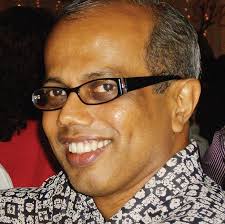Francis rails against the God of Money
The Bishop of Rome has once again railed against the global economic system, this time zeroing in on the pervasive role played by the world of finance.
Jul 05, 2014

By Anil Netto
The Bishop of Rome has once again railed against the global economic system, this time zeroing in on the pervasive role played by the world of finance.
All kinds of dubious financial instruments, which very few lay people can understand, have led to immense profits for banks and other financial institutions.
Most of us should be familiar with the array of charges and fees imposed on ordinary people dealing with the banks – bank charges, cheque book charges and interest, credit card fees and late payment charges, to name a few.
The leading banks in Malaysia (and elsewhere) have been raking in billions of ringgit in profits. At the same time, household debt has soared as a result of low wages in the country and soaring property prices (due to speculation in land and property).
This has led to more people taking loans for housing, cars, higher education and quick cash and sinking deeper into the red as their credit card debt rises.
On the other hand, those with Big Capital are looking for new ways to invest their money, often in non-productive ways such as buying up land used for agriculture and using it for property development. In this endeavour, they are often assisted by banks and other financial institutions.
Said Francis: “It is increasingly intolerable that financial markets are shaping the destiny of peoples rather than serving their needs, or that the few derive immense wealth from financial speculation while the many are deeply burdened by the consequences.”
Francis said it was important that ethics plays its due part in the world of finance and that “markets serve the interests of peoples and the common good of humanity”.
The Pope also condemned speculation in food prices, which he said is a “scandal which seriously compromises access to food on the part of the poorest members of our human family”.
In other recent remarks, Francis said we live in a global economic system that is not good. “At the heart of the economic system there must be man, man and woman, and everything must be at the service of man.”
But instead we have put money in the centre, the god of money, he lamented. “We have fallen into the sin of idolatry, the idolatry of money. The economy moves with the anxiety of having more and paradoxically fosters a culture of waste.”
Because of such stinging remarks, Francis has been accused by right wing critics of following Marxism — a common charge that they use to level on academics, thinkers and activists who criticise an exploitative economic system and express solidarity with the poor.
Even the financial magazine The Economist joined in the fray: “By positing a link between capitalism and war, he (Francis) seems to be taking an ultra-radical line: one that consciously or unconsciously follows Vladimir Lenin in his diagnosis of capitalism and imperialism as the main reasons why world war broke out a century ago.
To this, Francis retorted that the communists were hardly the original standard bearers of the poor. “The flag of the poor is Christian.”
“Poverty and humility are at the heart of the Gospel, and I say this in a theological sense, not sociological. You cannot understand the Gospel without poverty, which, however, should be distinguished from pauperism.”
It is in this context that Francis added, “I believe that Jesus wants bishops to be servants and not princes.” To this end, Francis has come down hard against a couple of bishops who have splurged on accommodation that is not in keeping with the Gospel vision of poverty.
In our own lives, we should try and avoid falling into the trap of the idolatry of money, which prevents us from sharing the Gospel vision. It is also in this context that we should review all our parish renovation plans to ensure that they are in keeping with this vision of poverty and simplicity, found at the heart of the Gospels.
Simultaneously, we should look beyond our parish walls and try and analyse the forces of financial (and other economic) speculation that are widening the gap between a small group of the wealthy elite and the rest of society, who are struggling to make ends meet.







Total Comments:0